Salt Water Gargle Benefits: 14 Ways To Soothe Throat And Mouth
From treating dry cough to tooth decay – this age-old remedy can never go wrong!

Image: Shutterstock
Saltwater gargling is the old-school remedy that effectively treats and provides relief from a sore throat. It is an easy and safe way for soothing the pain and symptoms related to several respiratory conditions. The benefits of saltwater gargling can be attributed to its anti-inflammatory and antibacterial properties.
It has certain medicinal values that help heal canker sores, prevent upper respiratory tract infections, treat dry cough, relieve toothache, clear mucus, prevent gingivitis, and eliminate bad breath. This time-tested remedy also helps alleviate throat pain. This simple remedy has been trusted for generations and is popular among healthcare providers for its easy preparation and effectiveness.
In this article, we have discussed the potential benefits of saltwater gargling, how to prepare it, how to gargle with salt water effectively, and some risks associated with it. Keep reading!
 Know Your Ingredient: Salt Water
Know Your Ingredient: Salt WaterWhat Is It?
A solution made by dissolving salt into the water.
What Are Its Benefits?
It eases sore throat, heals canker sores, prevents respiratory tract infections, relieves toothache, and eases tonsilitis.
Who Can Use It?
It can be used by all, but especially people suffering from gingivitis, gum, and toothache might find this solution beneficial.
How Often?
You can gargle using salt water twice a day.
Caution
Avoid gargling for a long period of time and do not swallow the salt water.
In This Article
Benefits Of Salt Water Gargle
Gargling and rinsing your mouth with salt water provide a range of health benefits.
1. May Ease A Sore Throat

A sore throat can be a result of bacterial or viral infections or allergic reactions. Gargling with salt water may help relieve the condition (1).
Saltwater gargling works on the same principle as osmosis. It makes the environment in your throat inhospitable for the bacteria/virus. The solution flushes out the infection-causing microbes and may help build immunity against them.
Salt water gargle can help in the prevention of several infections and keep the mouth clean (2).
2. May Heal Canker Sores
Canker sores are small bothersome ulcers occurring in your mouth. They can be sensitive and quite painful. Accidentally biting the inside of your cheek, sensitivity to certain foods or hormonal fluctuations during menstruation can cause canker sores.
Salt water gargling can relieve the associated pain. It may also accelerate healing and recovery in infants and children (3).
3. May Prevent Upper Respiratory Tract Infections

Salt water gargle may help reduce upper respiratory tract infections, like flu and common cold. It is also one of the effective home remedies for strep throat and may help reduce inflammation and soreness.
According to one study, gargling with warm salt water thrice a day is an easy and cost-effective way to decrease your risk of developing an upper respiratory tract infection by 40% (4).
A study conducted on 338 Hajj pilgrims found that salt water gargle helped reduce the incidence of respiratory tract infections (5).
4. May Treat Dry Cough
Saltwater gargle works equally well in treating a dry cough as well as one filled with phlegm. Gargling with salt water works as an anti-tussive (it helps stop a cough) (6).
Briz Pal, a blogger, shared how salt water gargle helped combat his flu during his school days. He said, “My mother used to give me hot salt water to gargle whenever I used to have a cold and cough. Result was that I hardly missed any day of school because of a cough , cold or fever (i).”
5. May Relieve Toothache

A toothache occurs due to the build-up of pus in the center of your tooth as a result of a bacterial infection. A saltwater gargle may relieve the pain by flushing out some of the fluid from the tooth.
You can rinse your mouth with salt water every few hours. Salt is a natural disinfectant that may help ease the swelling in tissues (7).
6. May Treat Dental Plaque And Prevent Gingivitis
Saltwater gargles may treat and prevent dental plaque and gingivitis. Plaque is a sticky film of bacteria that forms on the teeth and along the gum lining. If left untreated for too long, it can harden into tartar and eventually develop into gingivitis. Salt is commonly used in different DIY homemade mouthwashes, along with other ingredients, to help reduce plaque formation.
Gingivitis is characterized by swollen, painful gums. It can also lead to more serious oral diseases and loss of teeth. The best way to prevent this is by gargling with warm salt water a few times a week. This helps remove the plaque build-up on your teeth (8).
7. May Clear Mucus And Relieve Nasal Congestion
Gargling with warm salt water may help thin out the mucus build-up in your respiratory tract and nasal cavity and expel it (9). This reduces inflammation and may relieve throat pain.
The warm salt water also flushes out the bacteria and virus, which may otherwise lead to congestion. Limited research is available at this point, and more studies are required to conclude. Anecdotal evidence shows that saltwater gargles may relieve nasal congestion.
8. May Maintain Natural pH Levels
There is limited evidence available in this regard. Anecdotal evidence suggests that salt water helps neutralize the acids in the throat produced by the invading bacteria and helps maintain a healthy pH balance.
A normal pH balance helps the natural bacteria in your throat and mouth to thrive. It also prevents unwanted bacteria from accumulating and causing infections.
9. May Eliminate Bad Breath
For those wondering “how to get rid of bad breath”, know that saltwater can provide you respite from this issue. A warm salt water gargle can neutralize the acids in your mouth. It may restore the natural pH level of your mouth and flush out oral bacteria. Anecdotal evidence also suggests that salt water gargles may help eliminate bad breath.
10. May Ease Tonsillitis
Tonsils can get inflamed due to a bacterial or viral infection and lead to symptoms like sore throat, troubled swallowing, and a yellow-white coating on the tonsils (10). Gargling with warm salt water can help relieve the pain in your throat and ease some of these symptoms.
11. May Treat Bleeding And Swollen Gums
Bleeding and swollen gums are the first sign of bacterial gum disease. Rinsing your mouth with salt water can help reduce inflammation and fight the bacteria (11). Additionally, it can help flush out the bacteria from an abscess in your mouth that is causing the infection.
12. May Protect The Enamel
Salt water contains fluoride minerals that may provide protection or even reverse tooth decay. The fluoride in salt water prevents the loss of minerals from the tooth enamel and helps strengthen it.
It also neutralizes the acids in your mouth that attack and weakens the enamel on your teeth (12). Hence, a salt water rinse needs to be incorporated in your dental routine.
13. May Aid Gingival Wound Healing
Oral diseases like gingivitis cause the gums to weaken and become more susceptible to injury. Over time, the teeth also loosen from their place.
A study conducted in Thailand has found that rinsing your mouth with salt water could promote rapid healing of any wound in the connective tissues in your gums. It also restores gum health (13).
14. May Fight Candidiasis
Candidiasis is a fungal infection caused when the yeast Candida starts growing in the mouth, throat, or esophagus. This can lead to symptoms like white patches in your mouth and throat, a cottony sensation in your mouth, and pain while swallowing.
Salt has antimicrobial properties. Rinsing and gargling with salt water may help fight Candida infection (14).
 Did You Know?
Did You Know?Here’s how you can make salt water gargle at home.
Key Takeaways
- Salt water gargle can help in the treatment of small ulcers in the mouth that are often caused due to hormonal imbalance during menstruation, or food sensitivity.
- It is a cost-efficient remedy for treating respiratory tract infections.
- Salt water gargle can help reduce nasal congestion and remove mucus.
- Gargling with salt water may help reduce inflammation in the gums and fight bacterial infection in the mouth.
How To Prepare Salt Water For Gargling
Preparing salt water at home for gargling is very easy. You just need to follow the procedure below:
- Add half a teaspoon of either table salt or sea salt to a cup of warm water. Stir until the salt dissolves completely.
- Ensure the solution is not too hot.
 Quick Tip
Quick TipIn the following section, we will look at how you can gargle with salt water effectively.
How To Gargle With Salt Water Effectively

- Take as much of the solution into your mouth as is comfortable.
- Gargle the salt water near the back of the throat.
- Rinse the water around the mouth, teeth, and gums.
- Spit out the solution.
The salt water solution is generally safe to swallow. But if you have any oral infection, it is always better to spit it out. Gargling with salt water twice a day is recommended for maximum effectiveness. If you are wondering how long you should keep gargling to see effective results, scroll down to know more.
How Long Does Gargling Salt Water Take To Work
Generally, gargling with warm salt water provides relief relatively quickly, often within a few minutes of the first rinse. It is advisable to gargle about 2-4 times a day for a duration of about 30 seconds to 1 minute for best results. Swish around the warm salt water in your mouth and gently gargle to help distribute the solution and maximize its effectiveness. However, remember that the duration of relief may vary from person to person depending on the severity of their illness. Some individuals may experience immediate relief, while for others, it may take a bit longer. You may require a day or two of regular gargling to see significant improvement. Most people notice the quick results when pairing gargling with medication.
A person should gargle salt water solution for as long as possible. But before they do so, they must be aware of the possible risks of the process and the precautions to be taken.
Risks And Precautions
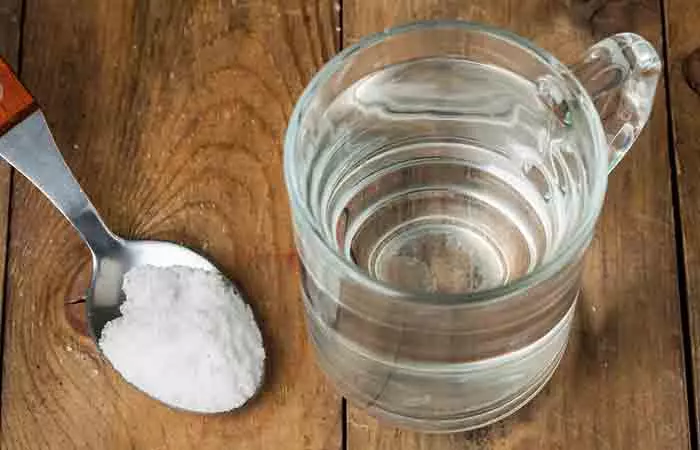
Risks
Though salt water gargling does not have any serious side effects, there are some ways it can affect you negatively:
- Gargling with salt water that has too much salt in it can lead to dehydration due to the elevation of plasma sodium levels (15).
- Swallowing too much salt water can be harmful as consuming excessive sodium can increase your risk of developing cardiovascular disease (16).
- Engaging in salt water gargling every day for a long period can soften the enamel of your teeth and gums due to its acidic content. Also, people with any medical condition or high blood pressure must consult a doctor before gargling.
Precautions
- Always check how hot the salt water is before gargling to avoid burning your mouth.
- If you feel the salt water is too salty, dilute it by adding a little more water.
- Make sure the salt has dissolved completely before gargling. Undissolved grains of salt can grate against the lining of your throat and cause more pain instead of alleviating it.
Infographic: Salt Water Gargle: Benefits And How It Works
Gargling with salt water is an age-old remedy for various throat and respiratory infections. Mix edible salt with warm water and gargle with the solution twice a day to ease sore throat. It also offers various other benefits. Check out the following infographic to learn more.
Some thing wrong with infographic shortcode. please verify shortcode syntax
The benefits of salt water gargling are not just limited to curing a sore throat. It can also effectively heal canker sores, help combat upper respiratory tract infections, manage dry cough, toothache, dental plaque, and gingivitis, clear mucus, and relieve nasal congestion. It also helps maintain the natural pH levels and is an effective remedy for bad breath. Therefore, it is clear that salt water gargling is an incredible and easy remedy that contributes to long-term oral and overall health. However, avoid adding too much salt, and always ensure the water is not too hot.
Frequently Asked Questions
Should you rinse with salt water before or after brushing?
You can rinse with salt water either way. The saltwater rinse will act as a mouthwash and keep your mouth clean.
What is the ratio of salt to water to be taken for gargling?
You need a cup of water for half a teaspoon of table salt or sea salt.
Can salt water whiten teeth?
No, salt water may not whiten your teeth. But since salt water helps reverse tooth decay, as discussed above, it may help improve oral hygiene and health and the appearance of your teeth as a consequence.
Illustration: Uses Of Salt Water Gargling For Sore Throat, Cough & More
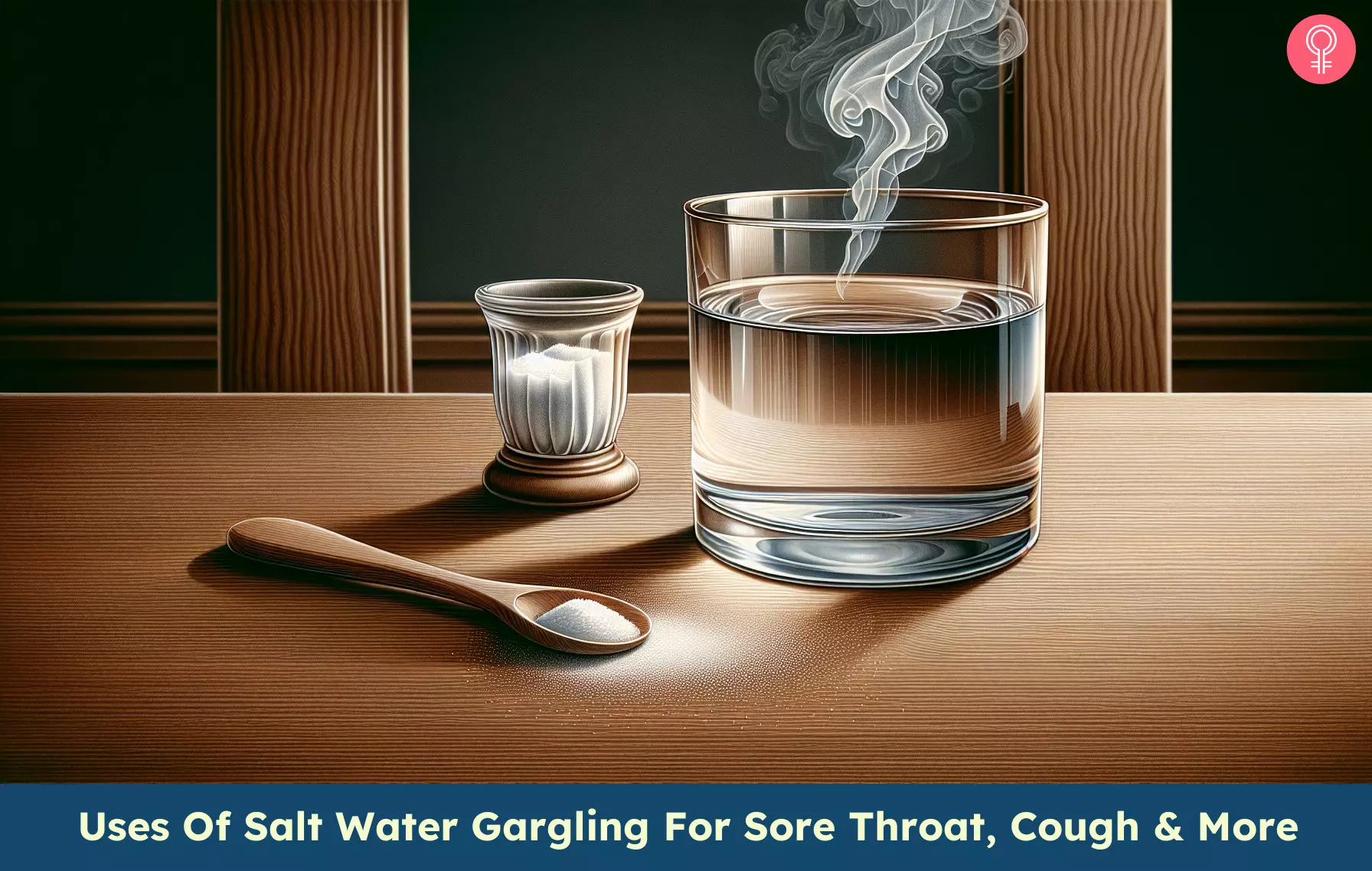
Image: Dall·E/StyleCraze Design Team
References
Articles on StyleCraze are backed by verified information from peer-reviewed and academic research papers, reputed organizations, research institutions, and medical associations to ensure accuracy and relevance. Read our editorial policy to learn more.
- Ramalingam, Sandeep et al. “A pilot, open labelled, randomised controlled trial of hypertonic saline nasal irrigation and gargling for the common cold.” Scientific reports vol. 9,1 1015. 31 Jan. 2019.
https://www.ncbi.nlm.nih.gov/pmc/articles/PMC6355924/ - Huynh, Nam Cong-Nhat et al. “Rinsing with Saline Promotes Human Gingival Fibroblast Wound Healing In Vitro.” PloS one vol. 11,7 e0159843. 21 Jul. 2016.
https://www.ncbi.nlm.nih.gov/pmc/articles/PMC4956236/ - Abu-Naser, Samy S., and Mohammed A. Hamed. “An Expert System for Mouth Problems in Infants and Children.” (2016).
https://www.researchgate.net/publication/301886798_An_Expert_System_for_Mouth_Problems_in_Infants_and_Children - Shimbo, T., et al. “COST-EFFECTIVENESS OF GARGLING FOR PREVENTION OF UPPER RESPIRATORY TRACT INFECTIONS: PIN19.” Value in Health 10.3 (2007).
https://www.researchgate.net/publication/23668287_Cost-effectiveness_of_gargling_for_prevention_of_upper_respiratory_tract_infections - Emamian, Mohammad Hassan et al. “Respiratory Tract Infections and its Preventive Measures among Hajj Pilgrims, 2010: A Nested Case Control Study.” International journal of preventive medicine vol. 4,9 (2013): 1030-5.
https://www.ncbi.nlm.nih.gov/pmc/articles/PMC3793484/ - Satomura, Kazunari, et al. “Prevention of upper respiratory tract infections by gargling: a randomized trial.” American journal of preventive medicine 29.4 (2005): 302-307.
https://www.researchgate.net/publication/7523162_Prevention_of_Upper_Respiratory_Tract_Infections_by_GarglingA_Randomized_Trial - Anyanechi, Ce, and Bd Saheeb. “Toothache and self-medication practices: a study of patients attending a niger delta tertiary hospital in Nigeria.” Annals of medical and health sciences research vol. 4,6 (2014): 884-8.
https://www.ncbi.nlm.nih.gov/pmc/articles/PMC4250986/ - Aravinth V, Aswath Narayanan MB, Ramesh Kumar SG, Selvamary AL, Sujatha A. Comparative evaluation of salt water rinse with chlorhexidine against oral microbes: A school-based randomized controlled trial. J Indian Soc Pedod Prev Dent. 2017;35(4):319–326.
https://pubmed.ncbi.nlm.nih.gov/28914244/ - Kryukov, A. I., E. V. Nosulya, and I. A. Kim. “Nasal irrigation: opportunities and disadvantages.” Vestnik otorinolaringologii 83.6 (2018): 76-80.
https://www.researchgate.net/publication/330889595_Nasal_irrigation_Opportunities_and_disadvantages - InformedHealth.org [Internet]. Cologne, Germany: Institute for Quality and Efficiency in Health Care (IQWiG); 2006-. Tonsillitis: Overview. 2013 Mar 27
https://www.ncbi.nlm.nih.gov/books/NBK401249/ - Gholami, M et al. “Common Perceptions of Periodontal Health and Illness among Adults: A Qualitative Study.” ISRN dentistry vol. 2012 (2012): 671879.
https://www.ncbi.nlm.nih.gov/pmc/articles/PMC3458291/ - Kanduti, Domen et al. “FLUORIDE: A REVIEW OF USE AND EFFECTS ON HEALTH.” Materia socio-medica vol. 28,2 (2016): 133-7.
https://www.ncbi.nlm.nih.gov/pmc/articles/PMC4851520/ - Huynh, Nam Cong-Nhat, et al. “Rinsing with saline promotes human gingival fibroblast wound healing in vitro.” PloS one 11.7 (2016).
https://journals.plos.org/plosone/article/authors?id=10.1371/journal.pone.0159843 - Wijnker JJ, Koop G, Lipman LJ. Antimicrobial properties of salt (NaCl) used for the preservation of natural casings. Food Microbiol. 2006;23(7):657–662.
https://pubmed.ncbi.nlm.nih.gov/16943065/ - Dmitrieva, Natalia I, and Maurice B Burg. “Elevated sodium and dehydration stimulate inflammatory signaling in endothelial cells and promote atherosclerosis.” PloS one vol. 10,6 e0128870. 4 Jun. 2015.
https://www.ncbi.nlm.nih.gov/pmc/articles/PMC4456159/ - Cappuccio, Francesco P. “Cardiovascular and other effects of salt consumption.” Kidney international supplements vol. 3,4 (2013): 312-315.
https://www.ncbi.nlm.nih.gov/pmc/articles/PMC4089690/
Read full bio of Dr. Thomas Connelly
Read full bio of Sindhu Koganti
Read full bio of Ravi Teja Tadimalla
Read full bio of Payal Karnik















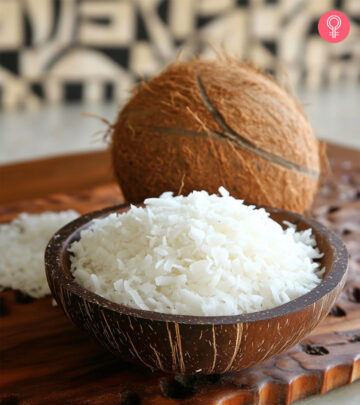
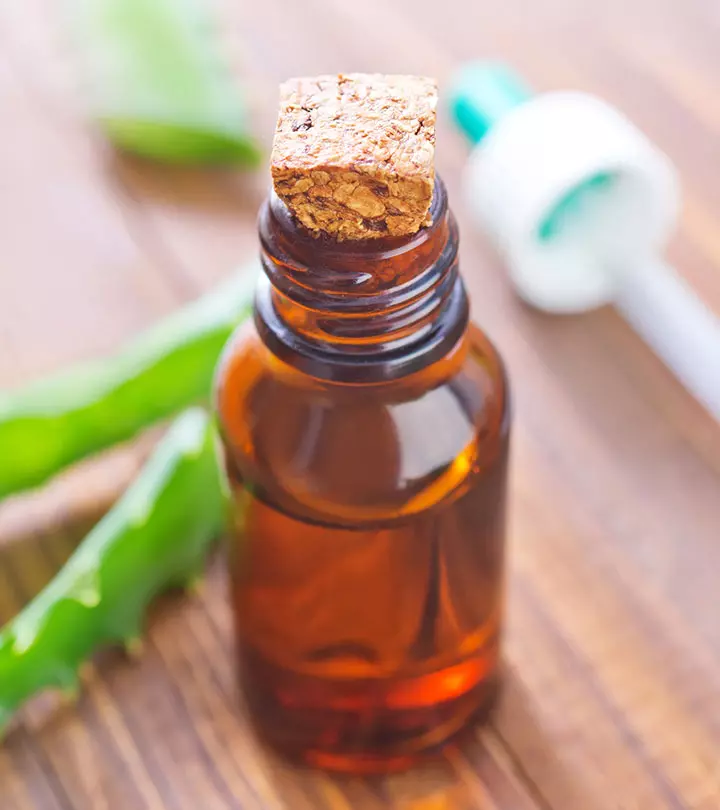
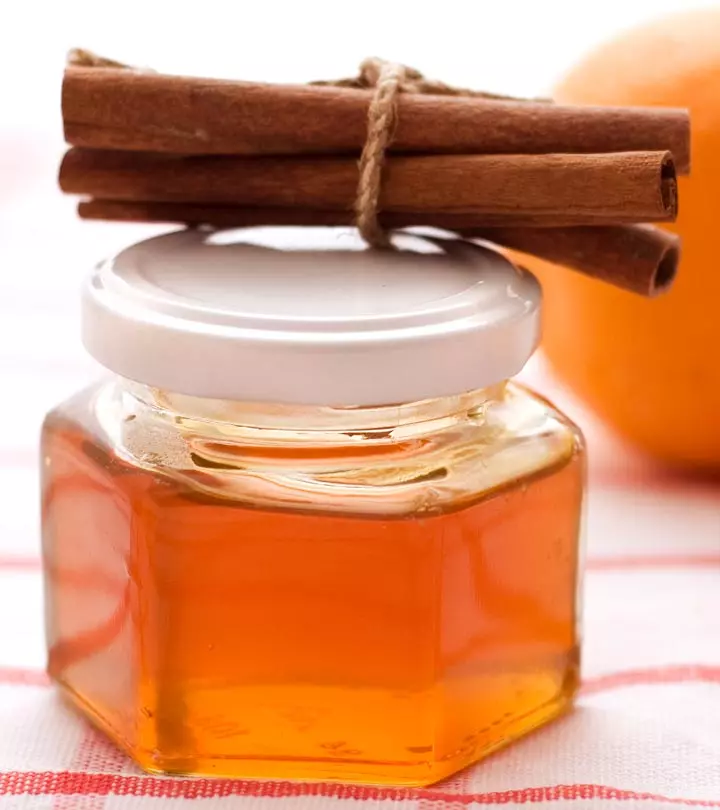

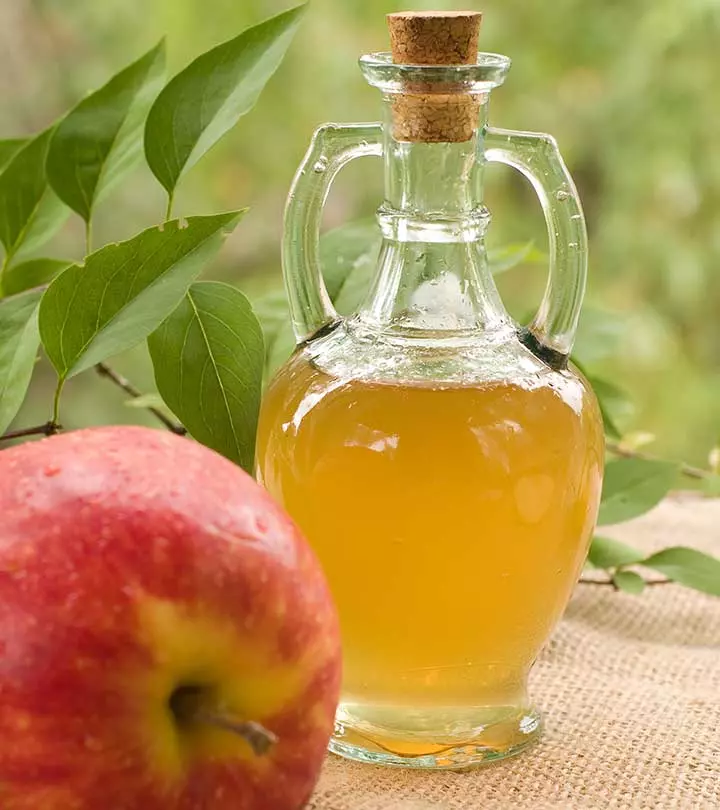

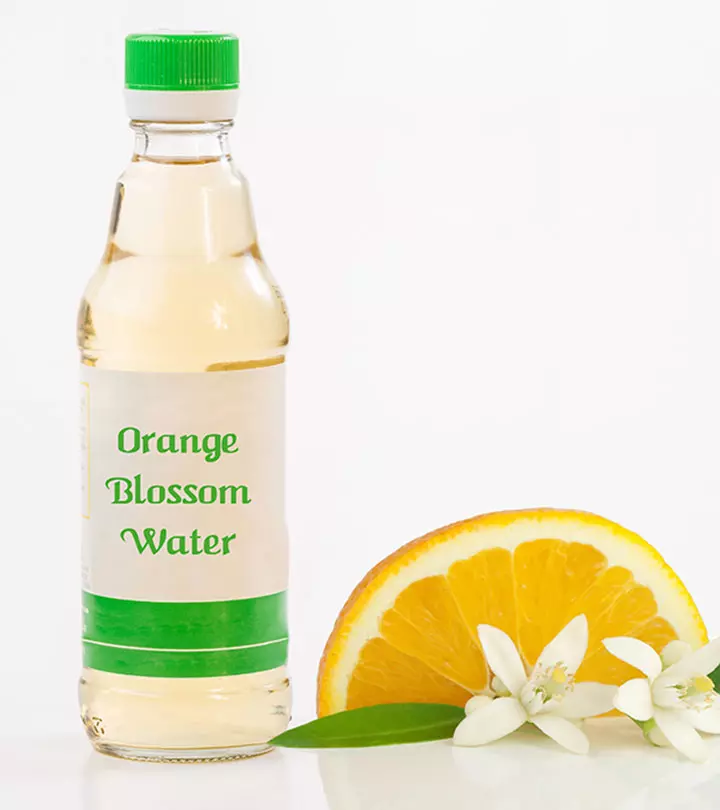

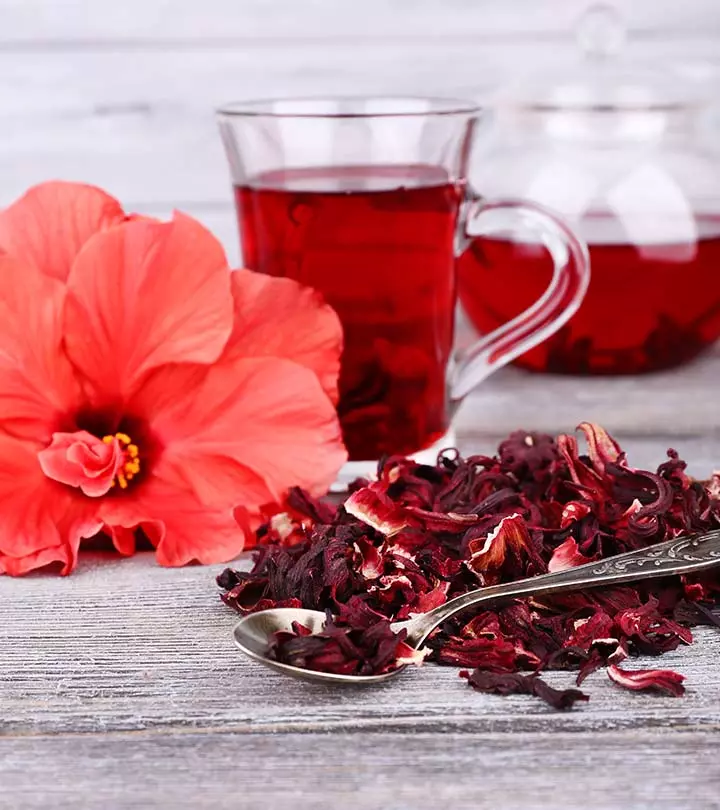


Community Experiences
Join the conversation and become a part of our empowering community! Share your stories, experiences, and insights to connect with other beauty, lifestyle, and health enthusiasts.